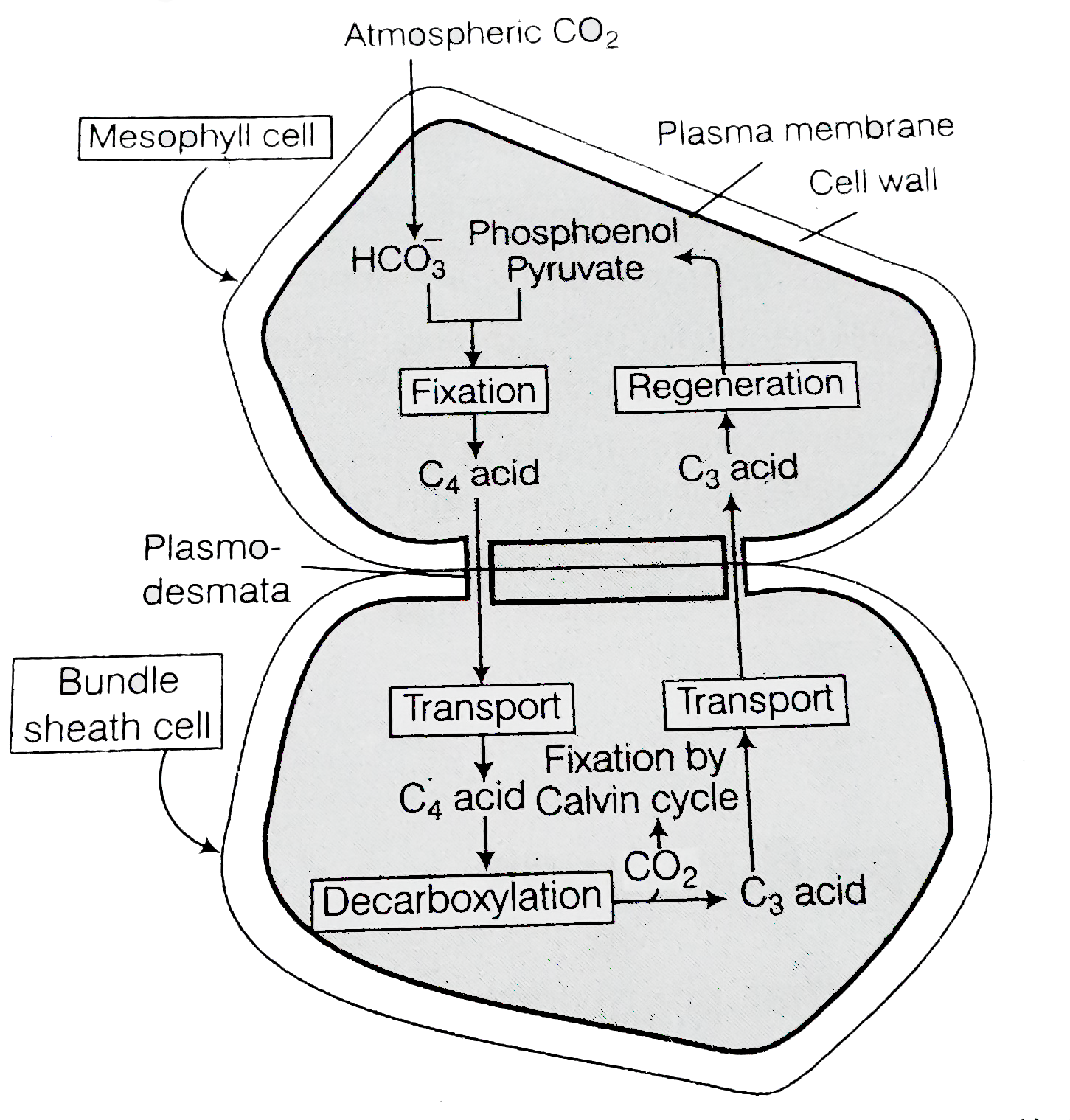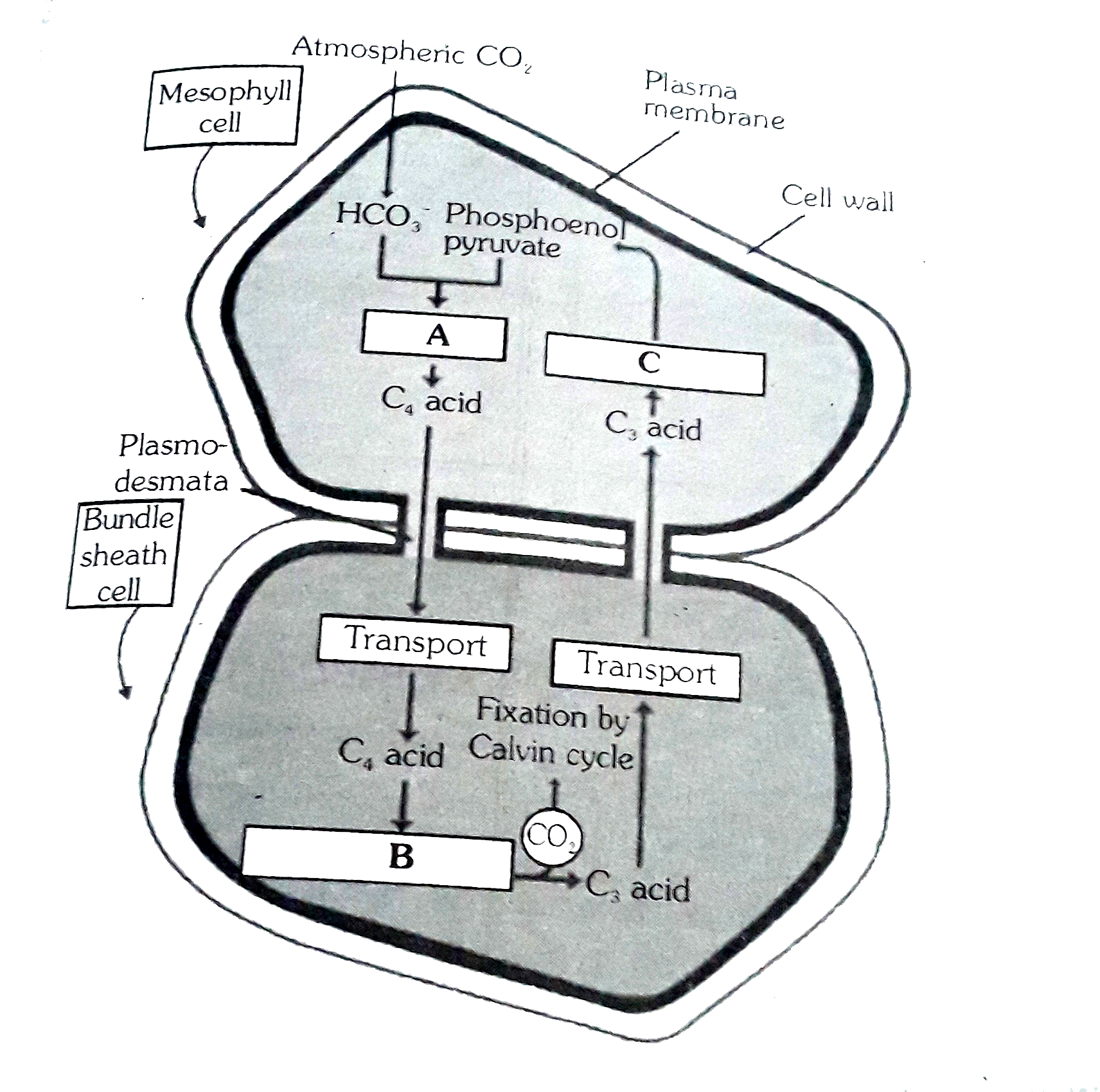Bundle sheath cells
Are rich is PEP carboxylase
Lack Rubisco
Lack both Rubisco and PEP carboxylase
Are rich in Rubisco
The correct Answer is:D
Step by step video, text & image solution for Bundle sheath cells by Biology experts to help you in doubts & scoring excellent marks in Class 12 exams.
Updated on:21/07/2023Topper's Solved these Questions
Similar Questions
Observe the diagram and answer the following:
(a) Which group of plants exhibits these two types of cells?
(b) What is the first product of C4 cycle?
(c) Which enzyme is there in bundle sheath cells and mesophyll cells?
View SolutionObserve the diagram and answer the following .

(a) Which group of plants exhibit these two type cells ?
(b) What is the first product of C4 cycle ?
( c) Which enzyme is there is bundle sheath cells and mesophyll cells ?
View Solution
Knowledge Check
Read the statements carefully and choose the correct option A) heat is well adapted to tolerate high temperature. B) Bundle sheath cells of maize seeds are larger thick walled without intercellular space. C) Breakdown of C_4 acid and C_4 pathway occurs in bundle seath cells D) C4 plants shows CO_2 concentration mechanism
AA, B and D are correctBB, C and D are correctCA and D are incorrectDB and C are incorrectA plant leaf is found to have bundle sheath cells having large-sized chloroplasts full of starch granules. Which of the following characteristics can be observed in this plant?
I. Stomata open at night.
II. Presence of PEP carboxylase in mesophylls.
III. Presence of RubisCo in bundle sheath cells.
IV High photorespiration rate in hot summer days.
V. Light reaction and carbon fixation as carbohydrates occur in different cell types.
VI. The carbon assimilation rate is saturated in the early morning on summer days.AOnly I, IIIBOnly II, IVCOnly II, IV, VDOnly II, III, VGiven below are some characteristics of photosynthetic plants. Which of these are true for C4 plants
(i) Rubisco is present in the mesophyll cells
(ii) 3-carbons in the primary CO2 acceptor
(iii) The primary CO2 fixation product is PGA
(iv) Possess PEP case.
(v) The intitial carboxylation reaction occurs in bundle sheath cells
(vi) The calvin cycle takes place in bundle sheath cells
(vii) 4-carbon atoms in the primary CO2 fixation product.A(i), (iv), (v), (vii)B(i), (ii), (iii), (iv), (vii)C(ii), (iii), (iv), (vi), (vii)D(ii), (iv), (vi), (vii)
Observe the given diagrammatic representation of the Hatch and slack pathway find out labelled parts and also choose true & false statement

(i) In the diagram site of primary fixation lacks RuBisCO enzyme.
(ii) In Mesophyll cell the transporting C4 acid amy be malic acid or aspartic acid
(iii) The bundle sheath cells are rich in an enzyme RuBisCO but lack PEPcase
View SolutionBundle sheath chloroplasts and Mesophyll chloroplasts.
View SolutionAssertion (A). Higher yield in case of bell pepper can be achieved by growing them in CO2 enriched green houses
Reason (R). Due to higher intracellular CO2 concentration in bundle sheath cells, RuBisCO mainly acts as carboxylating enzyme
View SolutionIn C4 plants, bundle sheath cell are characterised by
View SolutionThe carrier of CO2 from mesophyll cells to bundle sheath cell is
View Solution
